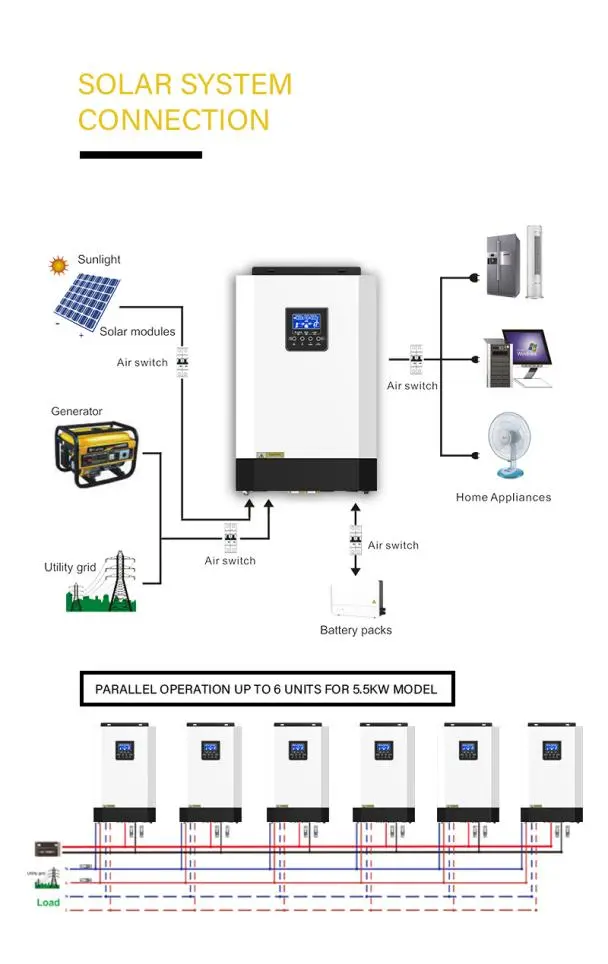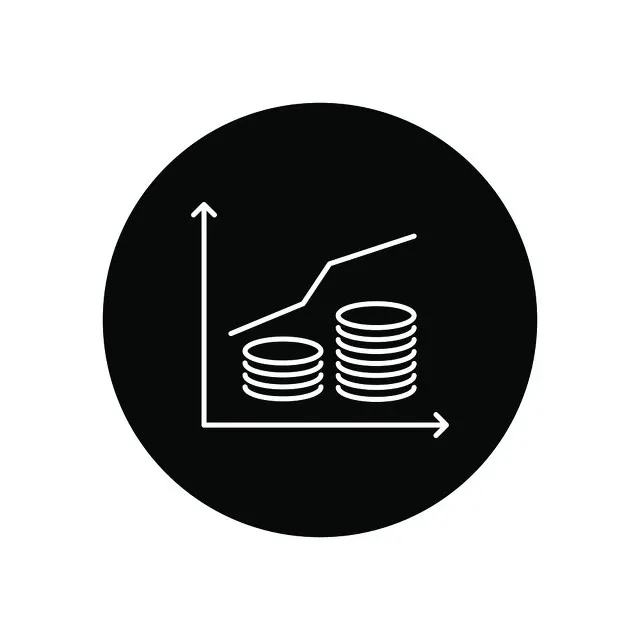- hisolar@cnhisolar.com
- +86-13905874507
Solar power is becoming more and more popular as the world becomes more aware of the importance of renewable energy. Solar panels are a common way to harness the sun’s energy, but they require an inverter to convert the DC power produced by the panels into usable AC power. Hybrid solar inverters are a type of inverter that can do this and more, and they can also store excess energy in batteries.


The on-grid function endows the inverter with the ability to feed back the electric network, which helps to make money for you, and maximize the use of PV energy to protect the earth.
The inverter can be self-adaptive to 50Hz or 60Hz output frequency.
Feature:
1: Remote LCD Display Optional
2: Wireless control
3: No Need Battery
4: Wide PV Voltage(120~500VDC)
5: MPPT intelligent control of charging current
6: Parallel Model Optional
7: Parallel operation up to 6 units

Sine wave currents can better protect your household appliances.
For example: WASHING MACHINE、TELEVISION、SOLAR ENERGY、AIR CONDITIONER、REFRIGERATOR、MICROWAVE OVEN、VACUUM CLEANER、ELECTRIC LIGHT、FAN

Inverters can be connected to energy storage power sources, power grids, generator sets, and solar modules. You can also connect any two or three of them and switch freely.

A hybrid solar inverter is a device that combines two functions: It converts the direct current from a solar panel into alternating current that can be used by a home or business, and it can store excess energy in batteries or feed it back into the grid. Hybrid solar inverters are a relatively new technology, and they are becoming more and more popular as solar power has grown in popularity.
Hybrid solar inverters work similarly to standard solar inverters. They convert the direct current generated by solar panels into alternating current, which can be used to power appliances, lights, and other devices in your home or business. However, hybrid solar inverters have an additional function – they can store excess energy in batteries for later use or feed it back into the grid.
When the solar panels produce more energy than is needed at the time, the excess energy is sent to the hybrid solar inverter. The inverter can then store the energy in the battery pack or feed it back to the grid. Hybrid solar inverters can use energy stored in batteries or the grid to power a home or business when solar panels aren’t producing enough power.
Hybrid solar inverters offer several advantages over traditional solar inverters, including:
Energy Storage: Hybrid solar inverters allow homes and businesses to store excess energy generated by solar panels for later use. This means they can use electricity previously generated by solar power even when there is no sunlight.
Backup Power: A hybrid solar inverter can act as a backup power source during a power outage. When the grid goes out, a hybrid solar inverter can use the energy stored in the battery to keep appliances running.
Increased efficiency: Hybrid solar inverters are more efficient than traditional solar inverters. They can convert more of the direct current generated by the solar panels into usable alternating current, meaning homeowners and businesses can get more energy from the solar panels.
Cost Savings: Hybrid solar inverters can help homeowners and businesses save on energy bills. By storing excess energy generated by solar panels, they can reduce their dependence on the grid and lower energy costs.
There are two main types of hybrid solar inverters:
Grid-tied hybrid solar inverters: These inverters are connected to the grid and can feed excess energy back into the grid. They can also draw energy from the grid when needed. On-grid hybrid solar inverters are ideal for homes and businesses that want to reduce their energy bills and have backup power during a power outage.
Off-grid hybrid solar inverters: These inverters are not connected to the grid and are designed to work with batteries. They store excess energy generated by solar panels in batteries for later use. Off-grid hybrid solar inverters are ideal for remote locations without access to the grid.
Hybrid solar inverters have several features that can make them more efficient and user-friendly. Here are some of the most common functions:
Battery Management System: This feature monitors the status of the battery and ensures that it is fully charged. It also prevents overcharging and over-discharging, which can damage the battery.
Grid-connected function: This function allows the inverter to feed excess energy back to the grid. It’s worth noting that some utilities have limits on the energy that can be fed back to the grid.
Backup Power: This feature allows the inverter to act as a backup power source during a power outage. Some hybrid solar inverters can automatically switch to backup power.
Remote Monitoring: This feature allows users to remotely monitor the performance of the inverter and solar panels using a smartphone or computer.
Installing a hybrid solar inverter is a complex process that should be done by a qualified professional. The installation process will vary depending on the type of inverter and the size of your solar power system. Regular maintenance is also important to keep the inverter and battery running properly. Maintenance tasks might include cleaning solar panels, checking batteries, and updating the firmware on the inverter.
Hybrid solar inverters are one of the great products to maximize the benefits of solar energy. They store excess energy for later use, act as backup power during a power outage, and help homeowners and businesses save on energy bills. They offer several advantages over traditional solar inverters, including energy storage, increased efficiency, and cost savings. As solar power becomes more popular, hybrid solar inverters will continue to play an important role in helping homeowners and businesses harness the power of the sun.

CE and RoHS guaranteed. And high-qualtiy electrical components: micro-controllers, bipolar junction transistors, IGBTs, MOSFETs, inductors, capacitors...are all used to contribute the high qualtiy of our products.

The experienced and professional staff of R&D Center are always there for you to help complete OEM or ODM services. In addition to this, they are also the centre of after-sale support service.

Over-thirty-year business development gives our company enough experience to face different emergencies, and it also helps to cultivate our experienced workers to give you better services.

The responsible salespersons of our company always think of their customers. Whenever there is any problem of the products, they will reply immediately to help troubleshoot the products' problems.

The monthly output is about 40,000 units, and the general mass production cycle is about 35 days. With proper stock, you can get standard products much earlier.

Six protection functions follow our products closely to keep you away from potential electric shock, your appliances away from damage.
The on-grid function endows the inverter with the ability to feed back the electric network, which helps to make money for you, and maximize the use of PV energy to protect the earth.
Note: Only when you make a grid-connected protocal, can the inverter play the on-grid function.
The LCD on the inverter's panel helps you to monitor the inverter's status at anytime you like.
RS232(WIFI communication) is for you to supervise the inverter's status via APP remotely. RS485(BMS communication) helps the inverter connect to the lithium battery to protect the batteries and extend their service life. Dry connect can make the inverter connect to the generator, giving you another power supply means.
The hybrid solar inverter of our company can also fulfill parallel-connect function to expand capacity for you.
Note: The hybrid solar inverter 3600w can not perform this function.
Built-in MPPTThe MPPT in the inverter can track the maximum power point to get as much power as possible from the PV panels, which helps to maximize the use of the solar energy.
When intelligent power supply mode is set, it can distribute solar panel/ mains/ battery power proportion smartly. It can maximize the power usage, save cost for you.

One-year warranty for you to help maintain the product better with our after-sale service.

With standard products in stock and intergrated configuration producing process, we promise you can get products as soon as possible.

Easy WiringClearly labeled icons on the panel are for you to complete the wiring tasks easily, safely and quickly.

Detailed panel design and smooth lines are for you to use it easily and conveniently.

High usage efficiency of energy is for you to decrease electricity bills and help you save money better.

The professional business people with the help of our engineers will support you to choose your proper products and solve tackles you meet before, during and after you place the order.
High-frequency hybrid solar inverter, with multiple functions in one, can convert PV power into AC output. Additoin to this, it can also collocate with electricity network, generator and battery to give uniterruptible power supply to you. Intelligent power supply mode helps to distribute power smartly to help save energy and provide convenience to you.

1. The power of the inverter is determined by the total power of the appliances the inverter needs to carry.
2. The Max.PV input voltage of all these three inverters is 500v DC, which means that the total Voc of the PV module can not exceed 500v DC.
3. The PV maxinput current constrains the input current from PV modules, that is to say, even the PV real input current exceeds the defined current input of the MPPT, the real current input is the nominated current input of the MPPT.
4. The working voltage of the battery should be the same as the inverter’s defined voltage in the specs.
5. The input voltage from the grid and the output voltage, frequency should be the same as your nation’s electricity-network standards.

We value your privacy
We use cookies to enhance your browsing experience, serve personalised ads or content, and analyse our traffic. By clicking "Accept All", you consent to our use of cookies.